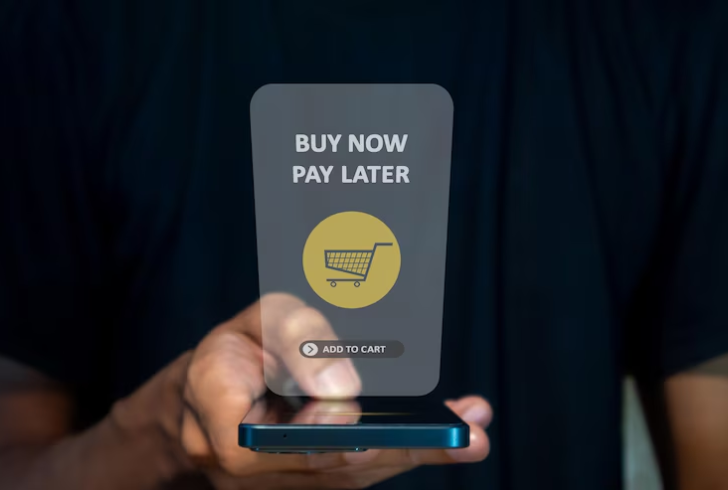Since inflation spiked in 2022, the financial landscape in the United States has changed drastically. Prices for essential goods and services remain high, and most households continue to feel the pressure. While inflation has slowed from its peak, the cost of living hasn’t followed suit. From groceries to rent, Americans are spending more while income levels stay relatively flat.
This prolonged strain has led to increased household debt and a surge in alternative payment methods, most notably Buy Now, Pay Later (BNPL) services. As this trend continues, experts warn that many consumers may be walking into a new cycle of financial risk—often without realizing it.
Cost of Living Outpaces Wages
Prices are still increasing, but at a slower pace, even if the inflation rate has decreased since hitting 9.1% in 2022. Basic necessities remain expensive. Grocery bills, in particular, have climbed significantly, with many families now allocating over $1,300 per month to feed a household of four.
In addition to food, rent and mortgage payments are stretching budgets even further. To keep a roof over their heads, some city dwellers spend over 30% of their monthly salary. This imbalance has pushed Americans to look for creative ways to manage rising expenses.
Buy Now, Pay Later Fills the Gap

Image by fadfebrian on freepik | Buy Now Pay Later grows fast but brings new risks.
The popularity of BNPL services like Afterpay, Klarna, and Affirm has grown rapidly. These services allow shoppers to split purchases into interest-free installments. While originally intended for occasional big-ticket items, they’re now being used to cover basics like groceries and clothing.
One-quarter of Americans say they’ve used BNPL to buy groceries. That figure has nearly doubled in just one year. The appeal is clear—BNPL offers an easy way to make purchases without waiting for the next paycheck. But there’s a catch. Nearly two-thirds of BNPL users report missing a payment at least once, which can trigger additional fees or, worse, debt collection.
Younger Consumers Face Greater Risks
Younger consumers, especially Gen Z and millennials, make up the majority of BNPL users. For many, these short-term loans fund not only necessities but also non-essential experiences like vacations and concerts. A recent survey found that 60% of attendees at a major music festival used BNPL to finance their trip, including tickets, lodging, and food.
The problem isn’t just overuse—it’s misunderstanding. Many consumers think that timely repayment of a BNPL loan raises their credit score. In reality, most BNPL lenders don’t report positive payments to credit bureaus. Only missed or defaulted loans tend to show up, and when they do, they can damage credit scores significantly.
With TransUnion, Experian, and Equifax now planning to include BNPL data in credit reports, that impact could soon become more widespread. The shift means missed payments may follow users far longer than they expect.
Limited Regulation Leaves Consumers Exposed
Unlike traditional credit cards or personal loans, BNPL services operate in a gray area. These installment plans aren't subject to the same lending regulations. Because of that, there’s limited oversight on how the services are marketed or how they handle late payments.
This lack of regulation often leads to confusion. Users may not fully understand repayment terms, interest penalties, or how a single missed payment could affect their future borrowing power. Financial advocates have raised concerns, arguing that BNPL’s accessibility makes it easy to misuse, especially for younger or lower-income individuals.
In response, some states are exploring policy changes to increase transparency. However, before utilizing BNPL as a regular budgeting tool, users should carefully study the terms and exercise critical thought until more comprehensive regulation is implemented.
Inflation Pressure Continues to Reshape Spending
With grocery prices expected to rise further due to global trade tensions and supply disruptions, consumers will likely continue leaning on short-term credit. Food categories such as meat, dairy, and fresh produce are particularly vulnerable to rising costs, and trade-related tariffs could intensify the issue.

Image by muqddas65 on freepik | Families feel the squeeze as food prices climb faster than paychecks.
Even though wages have seen modest increases, they haven’t kept pace with the cost of living. This gap creates a dangerous cycle—families take on more debt just to meet their needs, which in turn makes it harder to achieve long-term financial stability.
BNPL services may offer short-term relief, but without proper planning, they can add another layer of financial stress.
Smarter Choices Can Protect Against Long-Term Debt
Despite the risks, consumers do have tools to navigate economic uncertainty. Financial experts suggest taking a closer look at budgeting habits before turning to installment loans. Prioritizing essential purchases, cutting non-essentials, and setting up emergency savings can provide more lasting security than short-term credit.
When possible, using traditional credit cards with transparent terms or exploring low-interest personal loans may offer better protection. These options typically include clearer rules, consistent reporting to credit bureaus, and a stronger track record with financial institutions.
Consumers should also stay informed. As regulations change and credit-reporting practices evolve, understanding how new systems affect personal finances becomes increasingly important.
